Your Cart is Empty
TALK TO AN EXPERT: 1-844-945-3625
Menu
-
- Water Filter Systems
- Portable Solar Generators
- Propane Wall Heaters
- Composting Toilets
- DIY Buildings & Kits
- Canvas Tents
- Homestead & Off Grid Supplies
- Chicken Coops
- Harvest Right Freeze Dryers
- Emergency Food Kits
- Hunting Blinds
- MrCool DIY Mini Splits
- Solar Air Conditioners
- Solar Fridge & Freezers
- Camping Coolers
- Electric Coolers
- Overlanding Gear
- Two Person Cots
- Portable Sauna Tents
- Incinerating Toilets
- Dairy Equipment
- Coolers
- Faraday Defense
- EMP Shield
- Hunting Blinds
- Compost Tumblers
- Drip Irrigation Kits
- Shade Cloth
- Propane Fireplace
- Portable BBQ's
- Brands
- Chicken Coop Brands
- Composting Toilet Brands
- Solar Brands
- Food Storage Brands
- Freeze Dryer Brands
- Water Filtration Brands
- Incinerating Toilet
- Waterless Toilet Brands
- Heater Brands
- EMP Shield Brands
- Tent Brands
- Cot Brands
- Cooler Brands
- Dog Kennels
- Greenhouse & Gazebo Brands
- Portable Saunas
- DIY Shed Kits
- About Wild Oak Trail
- Resource Center
- The Ultimate Prepper & Emergency Survival Blog - Includes Free eBook
- Beginners Guide to Living off The Grid - Includes Free eBook
- Building Your Own Emergency Food Supply
- Best Survival Food to Be Prepared for Anything
- Berkey Lab Tests & Certifications
- Federal Solar Tax Credit - What You Need to Know
- BLOG
-
- 1-844-945-3625
- Login

TALK TO AN EXPERT: 1-844-945-3625
Boat Grill VS Regular Grill: What Do I Need?
by Patricia Turla 7 min read
Ever found yourself out on the water, wishing you could enjoy the same BBQ magic you have at home? Or maybe you’re wondering if your regular backyard barbecue setup can be just as epic on a boat? Many grill enthusiasts face the same dilemma: Boat Grill VS Regular Grill—what do I need?
Key Takeaways
What is a Boat Grill?
Boat grills are made from marine-grade stainless steel to withstand harsh marine conditions and include features for safety and stability in rough seas.
What is a Regular BBQ Grill?
Regular BBQ grills are typically constructed from materials like powder-coated steel and cast iron, making them ideal for land use but less suitable for marine environments.
Comparing Boat Grills and Regular Portable BBQ Grills
Boat grills are compact, rust-resistant, and designed for stability and safety in marine environments, while regular grills are bulkier, made from various durable materials, and suited for stable ground use with convenient mobility features.
Why Choose a Boat Grill When Boating?
Boat grills are ideal for boating due to their secure mounting, controlled ignition, rust-resistant marine-grade steel, and compact design for limited spaces.
Choosing the Best Boat Grill for Your Needs
Choose the best boat grill based on your boating and grilling frequency, fuel preference, and budget, as higher quality grills offer long-term durability despite higher initial costs.
What is a Boat Grill?
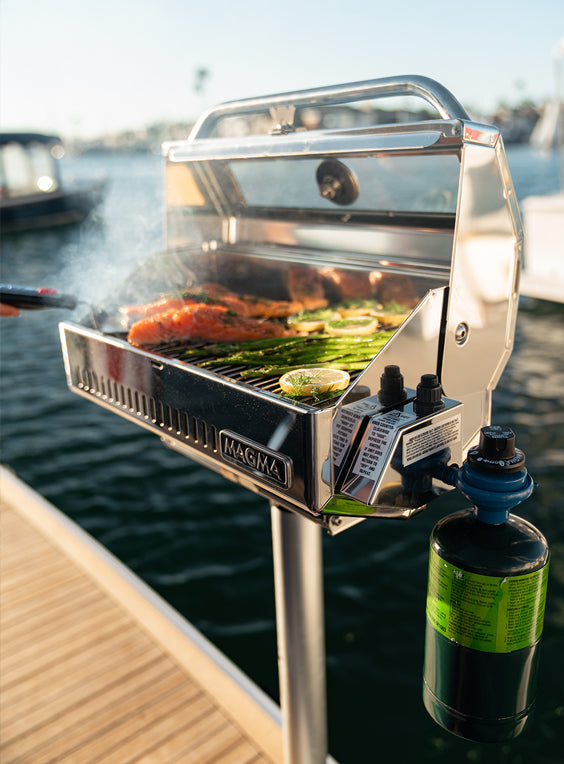
Boat grills are specifically designed to withstand the harsh marine environment. Constructed from marine-grade stainless steel, these grills are incredibly durable, resisting rust and corrosion from saltwater exposure.
Marine grills are built for reliability, featuring elements like a hinged lid and sturdy mounting systems to ensure they stay secure even in rough seas. Additional features often include safety mechanisms like push-button ignition and anti-flare-up designs to handle windy conditions on the water.
What is a Regular BBQ Grill?

Regular barbecue grills, typically used on land, are made from materials such as powder-coated steel, cast iron, and standard stainless steel. These materials offer good durability and heat retention, making them ideal for camping, tailgating, or backyard grilling.
Likewise, regular portable barbecues come with practical features like folding legs for easy storage and carrying cases for convenience. However, these grills might not withstand the marine environment or marine-grade stainless steel, making them less ideal for use on a boat.
Types of Grills
There are three main types of grills:
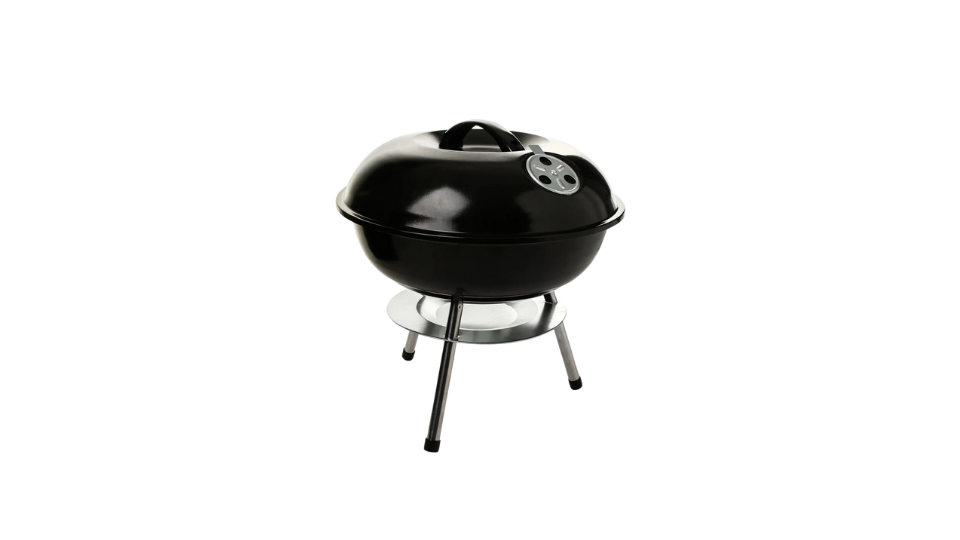
Charcoal Grills
On land, these grills are easy to set up and provide consistent heat, making them a favorite for traditional barbecue lovers. However, using a charcoal grill on a boat presents challenges. Managing hot coals and ashes on a moving vessel poses significant fire risks, and wind can make temperature control difficult. The clean-up process is also more complicated on a boat, where water and ash disposal must be handled carefully.
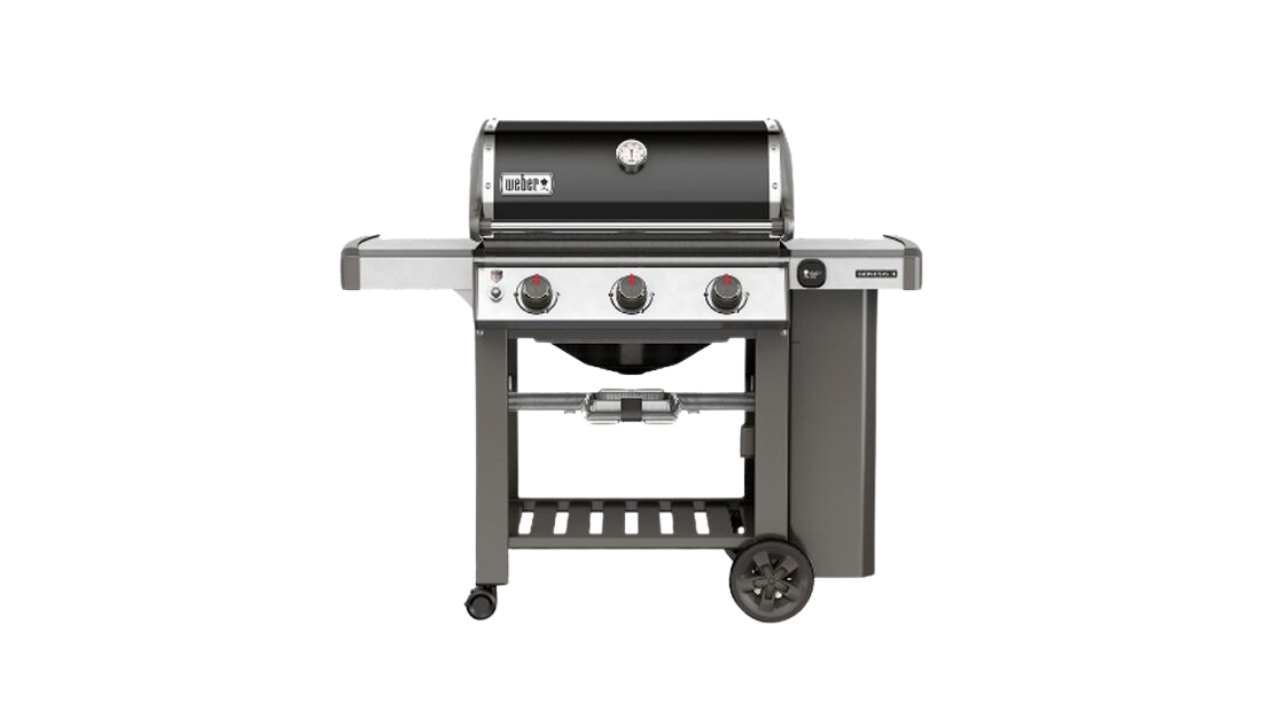
Gas Grills
Gas grills, using propane or natural gas, offer convenience and control, making them suitable for both land and sea use. On a boat, a gas grill with a propane tank is more practical because it provides steady heat and is easier to light, especially in windy conditions.
Features like a grease tray and push-button ignition add to the convenience. On land, gas grills are favored for their quick start-up, adjustable heat settings, and minimal clean-up. Precise heat control reduces the chances of flare-ups, ensuring evenly cooked food. The primary limitation for boaters, however, is the need to securely store propane tanks to prevent leaks and ensure safety.
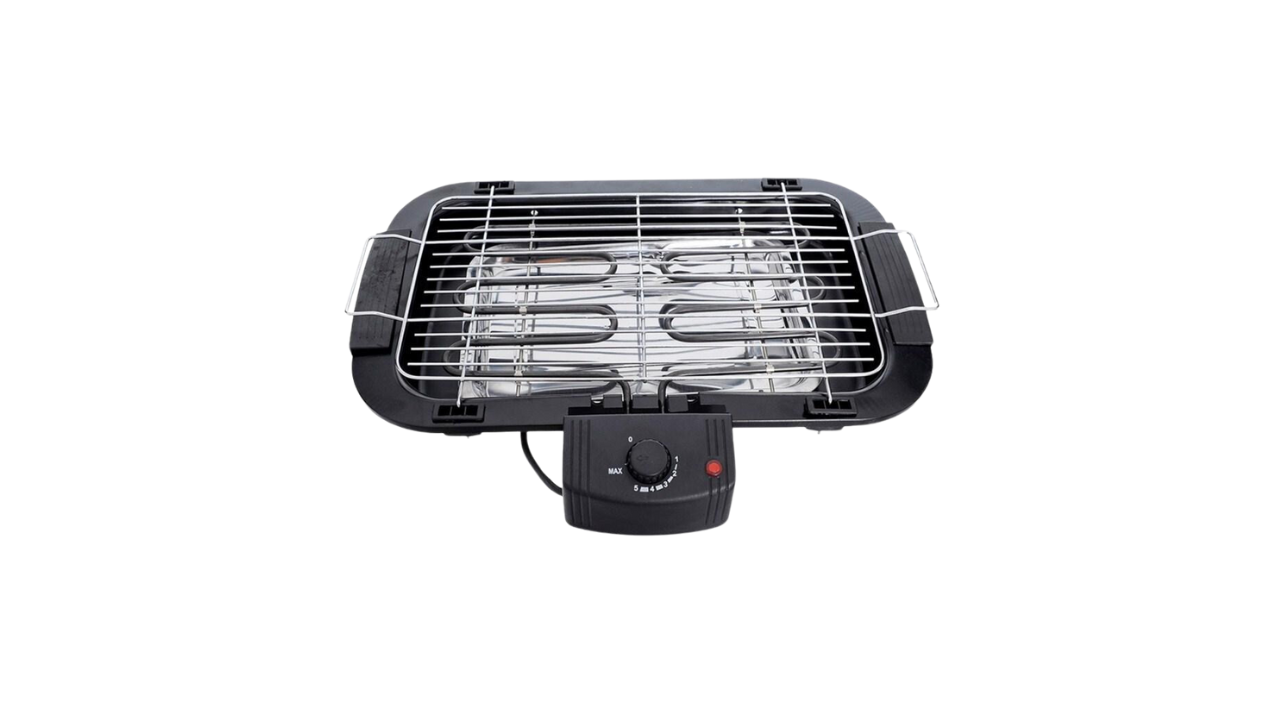
Electric Grills
Perfect for those who want a quick and easy grilling experience without the hassle of managing fuel. Electric grills simply plug into an outlet and are ready to go. These grills are often favored for use indoors or in areas with restrictions on open flames, offering a convenient and versatile grilling option.
Comparing Boat Grills and Regular Portable BBQ Grills
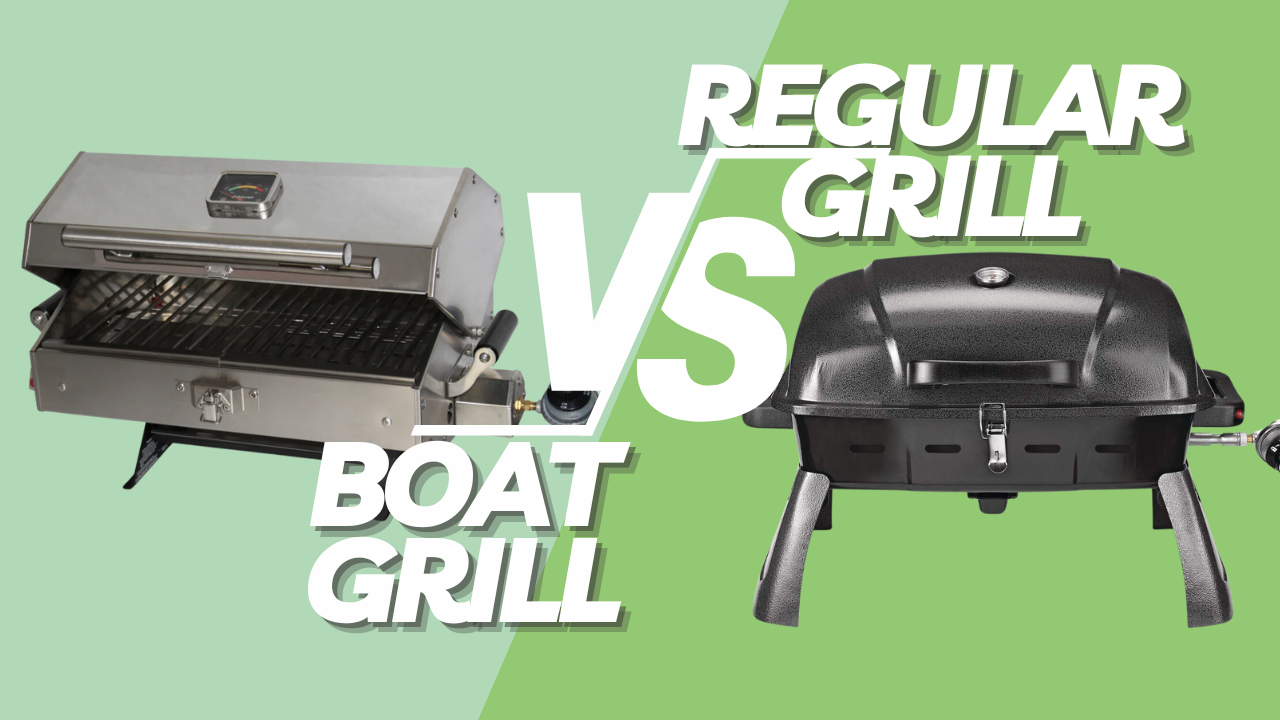
Boat and regular portable BBQ grills have advantages and cater to different preferences and situations.
| Aspect | Boat Grills | Regular Grills |
|---|---|---|
| Design and Construction | Designed for marine environments with marine-grade steel, compact and sturdy builds with hinged lids. | Constructed with durable materials like stainless steel, cast iron, and ceramic components for backyard or patio use. |
| Materials | Made from marine-grade stainless steel for superior rust and corrosion resistance. | Built to withstand various weather conditions with materials like stainless steel and cast iron. |
| Security | Equipped with mounting brackets, rail mounts, and locking lids to prevent tipping and ensure stability. | Relies on stable ground or surfaces; may have sturdy legs or wheels for mobility but lacks specialized securing mechanisms. |
| Safety Features | Includes flame control mechanisms to manage flare-ups and prevent fires; specialized mounting ensures stability even in choppy waters. | Features like flame tamers and grease trays manage grease and prevent flare-ups; stability relies on the surface. |
| Convenience | Lightweight, with carrying cases and quick setup mechanisms for easy transport and storage on boats. | With wheels, handles, and collapsible components, larger size and weight can make them less convenient to move compared to boat grills. |
| Storage Considerations | Designed with folding legs and compact designs to fit small decks and confined spaces on boats. | Requires more storage slots; features like side shelves, tool hooks, and storage cabinets help keep grilling accessories organized. |
| Performance | Excellent heat distribution and cooking efficiency with infrared burners and wind-resistant designs. | Offers excellent performance with charcoal grills, providing smoky flavor and grills, offering precise temperature control and quick heating. |
| Heat Distribution | Optimal heat distribution with advanced flame control systems to handle wind and uneven surfaces. | Provides excellent heat distribution and efficiency; both charcoal and gas grills deliver fantastic cooking results. |
Why Choose a Boat Grill When Boating?

What makes a boat grill different from a regular grill are the following:
Safety Considerations
Unlike grilling on land, the constant movement and limited room on a boat require specific safety measures. Marine grills are designed with resilience and secure mounting mechanisms to prevent tipping or sliding.
-
Folding Leg: A grill with strong, foldable legs and a secure mount ensures that even in choppy waters, your grill remains stable.
-
Hinged Lid: Locks in place prevent it from flying open unexpectedly, adding an extra layer of safety.
Preventing accidents involves more than just securing the grill. Ensuring safe grilling on a boat means keeping an eye on flare-ups and grease management.
-
Grease Tray: A grill with a grease tray helps prevent dangerous grease fires.
-
Controlled Ignition: Using a push-button system provides a controlled way to light the grill, reducing the risk of unexpected flames.
-
Fire Extinguisher: Always keep a fire extinguisher nearby and be mindful of wind direction to avoid flames spreading.
Resistance
Marine environments are harsh, with saltwater, wind, and weather conditions that can quickly degrade equipment not designed for such conditions. Marine-grade steel is the go-to material for boat grills, offering superior resistance to corrosion and rust.

Marine-Grade Steel
Ensures your grill withstands the elements, providing years of reliable service.

Weather Resistance
Weather and saltwater affect the longevity of a grill. A grill made from high-quality materials like marine-grade steel can resist these facets, maintaining its integrity and appearance.

Protective Covers
Many boat grills come with a cover or carrying case to protect them when not in use, further extending their lifespan.
Space and Design
Space on a boat is always at a premium, making the compact design of boat grills essential. These grills are specifically designed to fit in limited spaces without sacrificing cooking surface area.
-
Compact Design: A grill with a compact design can easily be stored when not in use.
-
Removable Parts: Some grills come with removable parts to make storage and transportation even more convenient.
-
Transportable Models: Compact grills can be stored in tight spaces, and features like detachable propane tanks and foldable parts make them easy to pack away when space is limited.
Choosing the Best Boat Grill for Your Needs
When selecting the best boat grill for your needs, consider—
Boating and Grilling Habits
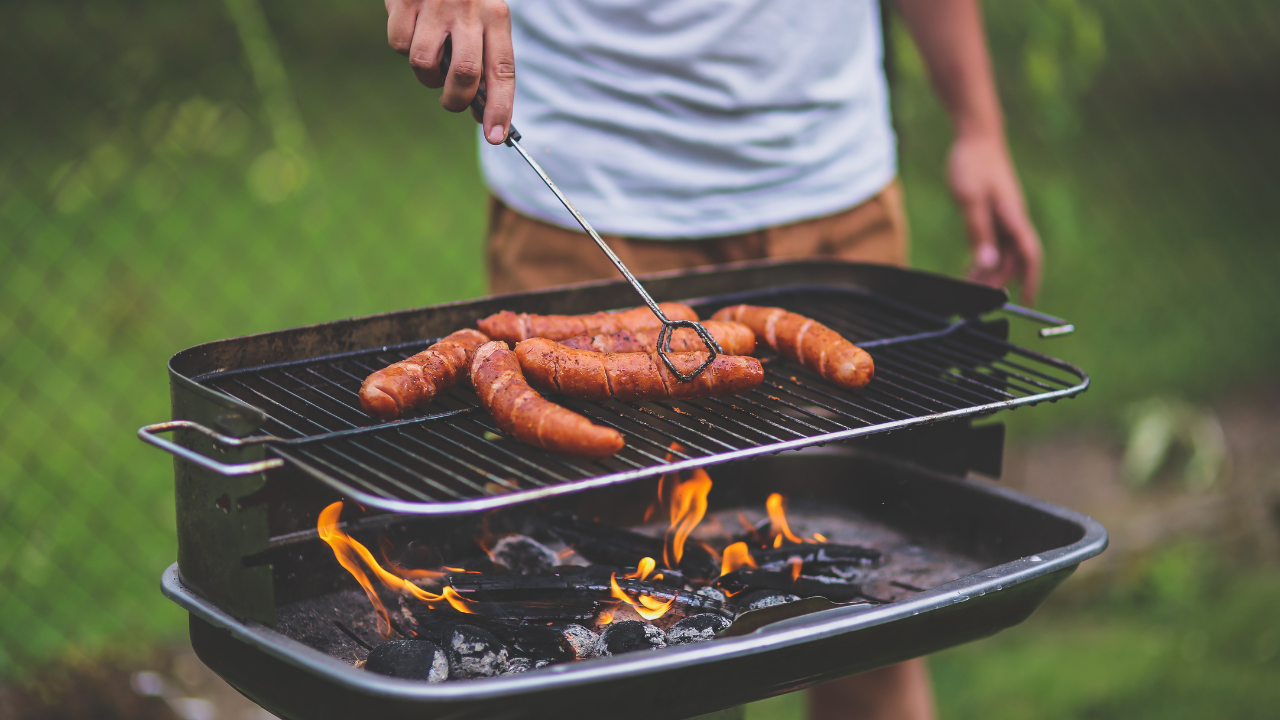
Assess your boating and grilling habits. How often do you find yourself on the water? Do you prefer gas or charcoal grills? Knowing the frequency of your boating trips and grilling activities can help determine if you need a heavy-duty marine grill or a more mobile option.
-
Frequency of Boating and Grilling: When you host a barbecue party every weekend, invest in a marine-grade steel grill.
-
Number of People Served: For small gatherings of 2 to 4 people, a small grill will suffice. For larger groups, consider a larger grill with additional features like a grease tray and more burners to cook different foods simultaneously.
Budget Considerations
Budget is an essential factor when choosing between a boat grill and a regular grill. Boat grills, especially those made of marine-grade steel, tend to be more expensive.
-
Cost Comparison: Regular grills might be cheaper initially but may not withstand the harsh marine environment as well. Investing in a high-quality boat grill might seem costly upfront, but it’s a long-term investment.
-
Long-term Investment: A reliable boat grill with features like a lockable lid, adjustable heat settings, and a strong mounting system can save money in the long run by reducing the need for frequent replacements.
Conclusion
Investing in a marine grill ensures that your on-water culinary experiences are safe, satisfying, and delicious. With the right grill on board, your boat becomes the best place to enjoy barbecues, surrounded by the beauty of the sea, lake, or marina.
When cooking steak, fish, chicken, shrimp, or just keeping food warm, a boat grill is an essential addition to your vessel. Bring along the boat grill next time you plan a day out on the water. Light up the burner, cook up some great onboard meal courses, and enjoy the ultimate boating experience.

Have any questions or would like to place an order? We'd love to help! Chat with our friendly customer service team by calling 1-844-945-3625, chatting in on our website or email us at customersupport@wildoaktrail.com. We look forward to hearing from you!
Leave a comment
Comments will be approved before showing up.
